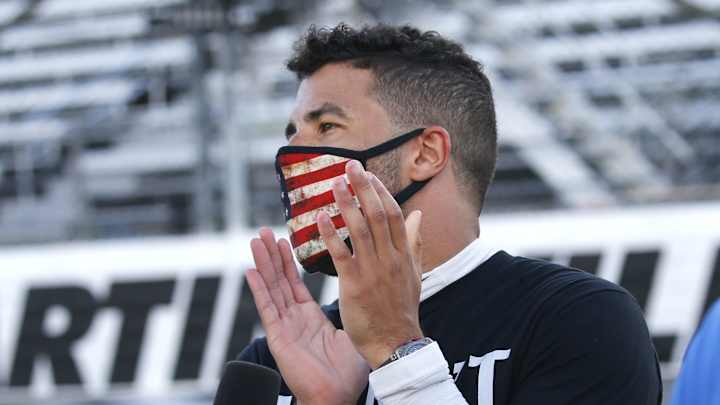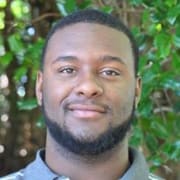OPINION: NASCAR's Bubba Wallace Providing The Next Generation With Role Model

When it comes to the sports world, my generation’s Martin Luther King Jr. is a racecar driver.
That may be a bit of hyperbole.
It doesn’t feel that way, though.
Since Bubba Wallace has been the diverse and the cool breath of fresh air racing has needed, and since I grew up following sports around Georgia, it reminds me of the days of Michael Vick in an Atlanta Falcons uniform.
Vick connected with NFL fans in general, but he was hugged most by African Americans throughout Atlanta.
He was fun to watch with his ability to run and throw with nearly unprecedented flair. He remains one of the most electrifying athletes to play professional football, especially as a quarterback.
I started playing football because of Vick. I wore a visor like he did. I had his cleats. I was a kid in Athens, Georgia who saw a face like mine on the cover of my first Madden football video game.
Controversy eventually struck Vick surrounding dog-fighting. Despite his unceremonious departure, No. 7 jerseys still fill Mercedes Benz-Stadium every weekend during the NFL season.
Now onto racing’s Vick.
Better yet, my Dr. King of athletics.
Before the FBI announced Tuesday that a noose found in Wallace’s garage Sunday at the Talladega Superspeedway in Alabama had been there since October, which means it wasn’t directed at Wallace, none of that was known Monday during his moment of clarity.
It was Wallace’s opportunity to confront his controversy head on.
He handled it beautifully.
He walked up the front stretch of Talladega, his fist raised. He made a beeline for a group of fans situated at the bottom section of the crowd that attended Monday’s NASCAR Cup Series race.
Wallace shook hands and thanked the group before turning around to grant Fox Sports its post-race interview.
The 26-year-old driver from Concord, North Carolina spoke about the perpetrator who allegedly placed a noose in his garage during Sunday’s rain delay. He looked directly into the camera.
“Sorry I’m not wearing my mask, but I wanted to show that whoever it was wasn’t going to take away my smile, and I’m going to keep on going,” said Wallace, channeling words that a certain Civil Rights icon might have uttered on that occasion.
Perfectly placed behind Wallace, NASCAR’s only African American driver in the Cup Series, was that splatter of African American fans at a NASCAR race. Their fists rose to match his, as the Wallace backers sported shirts supporting the Black Lives Matter movement.
A lump emerged in my throat. Tears welled in the corners of my eyes, and I paused the broadcast to take everything in.
Upon hearing the initial news of the incident, I had to go and sit in my room to gather my thoughts.
I was angry.
I felt betrayed.
Neither I nor anybody else knew back then what FBI officials would say later about the noose representing no threat to Wallace.
Wallace finished 14th in the 40-car field after running out of gas in the late stages of the race.
It wasn’t about Wallace’s performance on the track. He got in the car, which was huge. Then there was the sight of the other drivers and their team members showing their respect and acceptance for Wallace before the race by walking as one with the driver while pushing his car to the front of the pack.
For the first time, I felt NASCAR had a person that African American viewers could rally behind.
While growing up in SEC football country during the 1990’s, I cherished the Falcons of Deion Sanders and later the Dirty Birds, but I’ve loved NASCAR since I could speak. My grandmother bought me a toy racecar as a gift when I was little.
I begged my parents for more cars.
Eventually, my collection of die-cast cars reached the hundreds. I carpet burned my knees and turned the family’s coffee table into the track the series was visiting that week.
It was a part of myself that didn’t get the social nurturing I received when I talked about football or basketball with my friends at school.
NASCAR didn’t have a Black driver for us to wrap our arms around. I knew of Bill Lester because I followed the sport closely. But even though he became the first African American driver to win in the Rolex Sports Car Series (2011), his pro racing career of more than a dozen years was only a start. It lacked the success or pop appeal that Wallace has gained already during his fourth year of Cup Series racing.
Wallace has earned six victories in the Truck Series, and he has 35 Top 10 finishes in the Xfinity Series.
At the premier level, he has six top 10 finishes.
This year, Wallace has endeared himself to sports fans and Americans everywhere wits his unshaken manner, his ability to perform under pressure and his willingness to take on the Black plight in a predominately white sport.
Following the death of George Floyd, Wallace has found a way each week to speak against social injustice. Ranging from the “Black Lives Matter” paint scheme on his car to the request to remove the Confederate flag from racetracks, he has made NASCAR cool.
For the first time, young Black boys and girls can root for somebody who represents them. It’s much like the time I wore that visor and those cleats of No. 7, even though I didn’t play quarterback.
I can’t stop smiling.
Join the Falcon Report Community!
Subscribe to the Dirty Birds Podcast! Available on iTunes, Spotify, Google Podcasts, iHeart Radio
Follow us on Twitter: @FalconsSI
